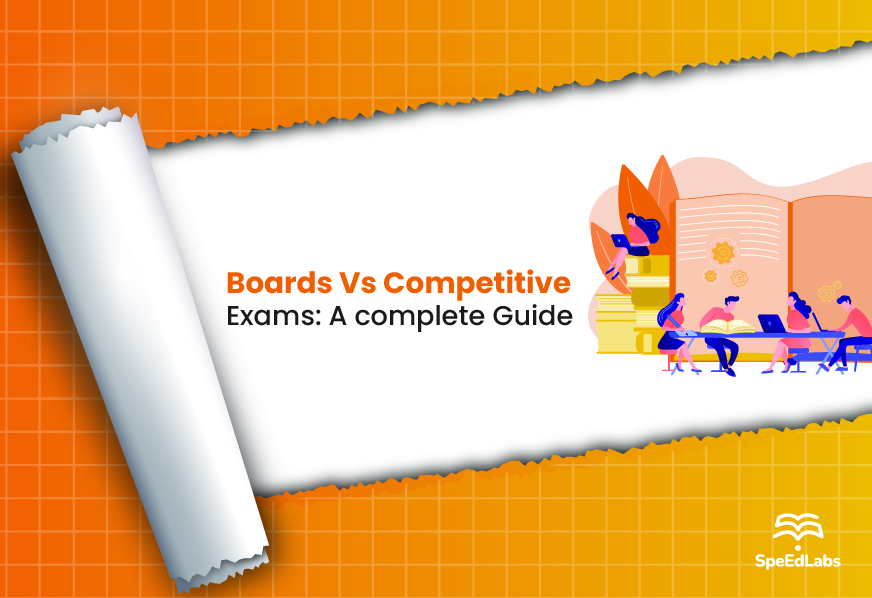Managing boards, entrance examinations, preparation, anxiety, and above all time are a few challenges students often face!
Exams have always been a source of concern for students. Exams can be unpleasant for some students, while others regard them as a life-changing event. However, despite all of this negativity, some students do not fear examinations because they understand how to maintain a balance and achieve good grades.
For optimism in exams, consider the following quote:
‘My advice is, never do tomorrow what you can do today. Procrastination is the thief of time’ – Charles Dickens.
Proper balance Between boards and Competitive exams
Are you in a standard where you have to face board exams and competitive exams both together? If this is the case, this blog is perfect for you as it covers answers to questions like:
- Is it feasible to prepare for both the Board and competitive exams simultaneously, or do you have to choose boards and prepare for the latter the next year?
- What is the best way to achieve a balance between board exams and competitive exams?
- Is it necessary to join coaching to clear the exams, or can self-study help me reach my goals?
There are numerous other questions in students’ minds, and as you progress further in this blog, you will find answers to most of them. So let us begin the blog.
The majority of parents and learners assume that competitive exams are tough. However, this is not the case. Competitive exams are different from board exams in terms of questions. Moreover, the base for both the exams is the same as you start from basic books like NCERT’s. If you know how to get out of both, it’s simple. Follow some easy steps and boom! You will be confident about both the exams.
- Focus on speed: Competitive exams are all about speed, where you have to finish a high number of questions in similar minutes. For example, in the NEET exam, 180 questions are there for all three subjects, and the time allotted is 180 minutes as well. It means that you have a single minute for every question. So, practice accordingly with the help of mock tests, previous year papers so that you can complete your exam on time. On the other hand, on boards, the exam is not at all on speed. However, this does not mean you are writing very slow, but yes, you have ample time to complete the paper if your strategy is appropriate.
- Negative marking: You must keep it in mind as it directly relates to your score in both exams. In the Competitive exams, almost all of them have a negative marking that means deduction of some marks every time you attempt a wrong question. Hence, solve your paper accordingly and mark the answer only if you are sure about the correct option. For boards, you don’t need to worry about any negative marking. So, attempt all the questions to score well as step marking is there in board exams.
- Topics that overlap make the preparation easy: One of the most likely effects of simultaneous study is content overlap. It’s critical to identify and manage such subjects as soon as possible so that you may dedicate enough time to other important topics. It not only saves time but also assures outstanding exam results.
- Types of questions: Handwriting and presenting abilities are of utmost value in board examinations because board examinations include subjective question patterns, whereas competitive tests have objective questions. Focus in competitive tests is on a comprehension of the concepts and their application rather than writing skills. You can exaggerate while writing subjective answers in board exams, but it is not possible with competitive exams as it requires point knowledge.
It was all about differences in both the exams. Now let us answer the above questions.
- Yes, it is possible to prepare for both exams simultaneously. All you need is a proper strategy and timetable. Do not change your working plan at any cost until you feel like you are not getting desirable outputs and adhere to your study schedule strictly. Moreover, stay away from any negative thoughts and distractions throughout your preparation. Include short breaks in your study cycle and maintain a proper sleep cycle.
- The second question deals with the balance between the two exams. To achieve this balance, do not skip any single day of study, especially during weekdays. When you study consistently, you stick to a set routine that balances your preparation for the day.
- The third and most common question is about coaching and whether it is mandatory or not. No, it is not till you are following the above two points with sincerity and punctuality. There are multiple sources available that can help you with your preparation. One such source is www.speedlabs.in, an all-in-one platform that guides students for boards and competitive exams. Here you will discover mentors that can assist you in clearing up any issues you may have about both Boards and competitive tests.
Key Takeaways
We can conclude that Competitive tests need a greater degree of application, yet both board and competitive exams demand a stable base and essential knowledge. We must try to maintain both of them simultaneously, and the only way to do so is regularity in studies and discipline.
Also published on Medium.
